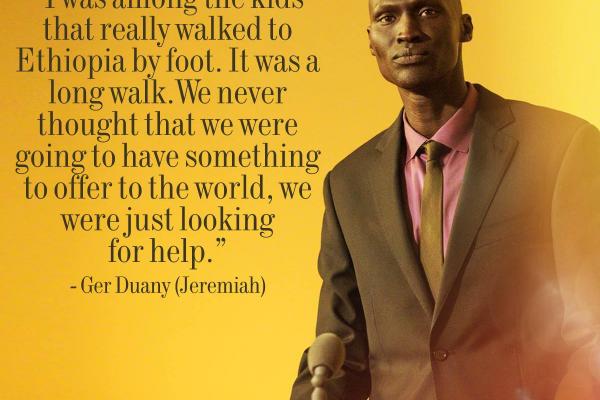As the Washington, D.C., premiere of Warner Bros.’ new movie, The Good Lie, came to a close, I could barely see the credits through my tears, but the noise of the crowd around me erupting into cheers and the standing ovation was impossible to miss. This film really touched me. I knew I had to write about it.
The Good Lie is the story of some of the "Lost Boys" of Sudan — orphans of war, who walked hundreds of miles fleeing violence, only to spend a decade in a refugee camp before finally being resettled in America. But the film is much more than that. It is a story about the power of faith and regular people who do incredible things because there is no one else who can. It is the story of immigrants — a funny and heartbreaking insight into what it is like to be a stranger in America. And it's a story and performance made all the more real because the Sudanese characters are played by actors who were child refugees and child soldiers themselves.
It stars Reese Witherspoon, whose character and role encapsulate so much of why this movie works. She's the headline draw for Warner Bros., but the movie is not about her. She helps the Lost Boys, but as is so often the case when we respond to God's call to care for our neighbor, they probably help her more. No one saves the day in this movie, but they all help save each other.
I got a chance to meet with Reese before the screening. Her main ask in our meeting was that I try to get teens and young people to see this film. She explained that all of her scenes were shot in the U.S., but after reading the script and meeting her Sudanese-American co-stars, she felt she had to go to the African shoot. She took her teenage daughter with her to the refugee camp where several of her costars grew up.
Reese Witherspoon said the experience of seeing that camp and experiencing even a small part of what these boys went through (and millions of God's children still go through) changed her. She told us her hope is that as Americans experience this story in theaters, they will be changed too. I was, and these stories were hardly new to me.
Most movies get the word out with lots of TV ads and posters, and Warner Bros. will put plenty of money behind advertising this film. But churches have started stepping up to add their voices and mobilize their networks as well. These are the kinds of messages we want coming out of Hollywood — ones of sacrificial love that inspire us to live for each other, that remind us that though darkness may last for a night, there can be joy too.
Watching how these boys from the Sudan turned the mundane and rather miserable lives of the Americans they met into purpose and meaning was quite moving to me. The story clearly reverses the notion of who helps whom — a common experience of what happens when people begin to "help the poor" in places like the Sudan, and even much closer to home. That is what our Scriptures tell us again and again — relationship with the poor changes our lives and brings us closer to God.
Sojourners is proud to join Oxfam America, Sudan Sunrise, and the Enough Project in sponsoring a second premiere in Washington, D.C., this week. Hundreds of churches and non-profits also are lining up to buy out theaters around the country to host watch parties. And there are very good church and social justice discussion guides available for groups. As the head of the World Evangelical Alliance, Geoff Tunnifcliffe, said: “It’s a story of courage, it’s a story of sacrifice, it’s a story that inspires you, but it also is a very real story about how one person can actually make a difference. There’s an opportunity, through this film, to mobilize many people.”
The Good Lie opens in limited release on Oct. 3, with a nationwide release to follow soon after. You should go. You should take your friends and family. You should take your older children. You should let this movie touch your heart and inspire you with lessons you will not soon forget.
Jim Wallis is president of Sojourners. His book, The (Un)Common Good: How the Gospel Brings Hope to a World Divided, the updated and revised paperback version of On God’s Side, is available now. Follow Jim on Twitter @JimWallis.
Got something to say about what you're reading? We value your feedback!
